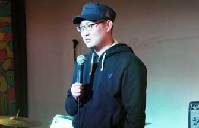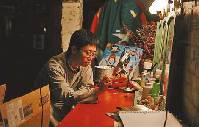Talking across cultures
By Belle Taylor ( China Daily ) Updated: 2014-01-19 08:01:21"Other xiangsheng actors, they take on maybe one or two foreign students. But none of them have really taken it to this level because he knows how to do it," Angiers says of his teacher.
"Mr Ding knows how to teach us like no one else does. He knows what all our levels are, that our backgrounds are different, our personalities are different. If you teach just the way you teach Chinese people, it won't work."
Angiers performs cross-talk across China, occasionally on television but mainly in local communities, retirement homes and small theaters.
He says he finds the crowds appreciative but notes older audiences are generally more attentive. He says that although some Chinese may find the art form dated, it's a whole new world for foreigners.
"For us, the older it is, the more new it is to us," Angiers says.
"It's fresh for us because it's different from anything else we would have seen nowadays in China or overseas because it's very Chinese."
David Moser was one of the first foreigners to become interested in cross-talk in the late 1980s, when he came to Beijing to study Chinese language and culture. Dashan was already making waves in China at that stage, but few other foreigners were pursuing cross-talk.
"As a way of learning Chinese, it's great because although the language is a little bit stagey, it's theatrical. It's still very much colloquial and in fact they use a lot of really great usable idioms, and there is a lot of word play that's used in daily life," says Moser, who eventually took the unusual step of writing a thesis on cross-talk.
"Cross-talk is only an academic pursuit for a few weird foreigners and a few Chinese who are interested in (folk performance arts)," he says with a laugh.
"Cross-talk is very much a grassroots art form that people love. For a long time, before 1949 - and even during the Mao (era) - it was almost synonymous with humor itself. It was the humor form in teahouses and in the countryside and it was very much a populist form of humor."
He may not appreciate the label "weird foreigner", but Jesse Appell from the United States also pursued cross-talk not only as a performance art but also as an academic study. Appell came to China on a Fulbright Scholarship to study Chinese humor and soon found himself drawn to cross-talk. He's also a regular in Ding's classes.
"I came to China and I wanted to figure out what Chinese comedy is like. And if you ask a Chinese person what Chinese comedy is like, they lead you straight to xiangsheng," Appell says.
Appell has made a study of Chinese humor, immersing himself in the world or cross-talk and also performing Western-style stand-up comedy in English and Chinese.
"My interest is in trying to find out what Chinese people think is funny," he says.
Has his study gained him any great insight?
He laughs at the question.
"I think the insight is: I don't think the senses of humor are as different as we think."
|
|
|
|
|
|
|
|























 Raymond Zhou:
Raymond Zhou: Pauline D Loh:
Pauline D Loh: Hot Pot
Hot Pot Eco China
Eco China China Dream
China Dream China Face
China Face





